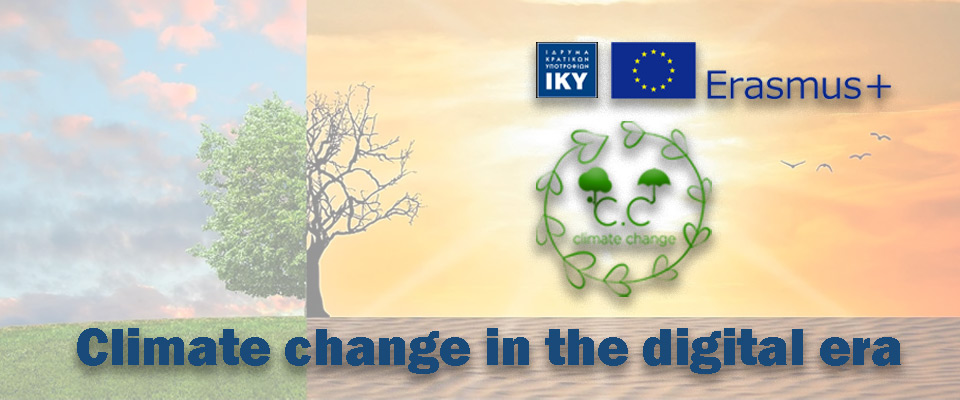The work of the teams of the 4 schools in the framework of the ERASMUS+ KA2 project on the topic: "Climate change in the digital era". This was the 4th meeting of students from the partner schools of SAPES (GREECE), STORD (NORWAY), VILLE-LA-GRAND (FRANCE), IISALMI (FINLAND). The last meeting took place in Iisalmi, Finland, as set out in the programme approved by the respective national agencies in August 2020 and which was postponed because of the coronavirus pandemic.
On the first day the hosts welcomed
the delegations and emphasized the value of cooperation for the 4 schools in
order to achieve the
local communities’ common good. The Headmaster of the Sapes High School said
the following in his welcome speech:
"Dear colleagues, Headmaster of the school, thank you for hosting this
last meeting of our student teams in a project that we started in difficult
health conditions but we managed to carry through. I want to thank first of all
all the students and their families who participated in this project from all
schools, the fellow teachers who participated in the pedagogical teams, the
Coordinators who took on a difficult task from coordinating to the results and deliverables of
the project to our local communities and beyond, as well as the school
principals for this collaboration in this educationally innovative but also
timely topic of our project.
Our schools may be from different cultural backgrounds with different languages, but we have proven that our common
language is the quality education and training that comes forward for the
common good of our students and our countries through our common path in the
European Union. The future belongs to us and we are open to partnerships and
new programmes that have been opened for the period 2023 - 2027".
During the week already underway, the students after being divided into mixed
groups (seven) held a feedback on what happened in the previous 3 meetings and
after the Iisalmi students presented their region, foods, customs and school,
the next phase found the groups meeting and planning concerning the future of our
planet. That is, each group would have to report and create a story scenario:
the bad (black, from the color of carbon) and the good (green, the color of
nature) that will prevail in the future in terms of climate change.
The story-script that the groups
created (it can be either one or both) about the future of the planet was a short film, collage, short
theatrical performance, video, presentation, etc. All results will be posted on
the schools' websites. Parallel activities carried out in addition to the
production of the scripts were the following in order:
1. A visit to a factory for recycling materials and separating them by category
and material.
2. Visit to a model livestock school. A school that teaches young livestock
farmers who learn how, through circular and sustainable development, each
livestock farmer can further develop his unit, produce quality and organic
products using renewable energy sources, wind and solar energy and geothermal
energy for his benefit, making the livestock unit energy self-sufficient but
also productive for electricity from other sources.
3. Visit to a private farm where the livestock Farmer produces Biodiesel
alone as fuel for his unit, but also produces electricity with photovoltaic and
wind systems, covering in total the needs of his business in electricity and
not only, but sells electricity to other customers accordingly.
4. Visit to the University of Eastern Finland in the city of Kuopio with high
standards internationally and very high in the world ranking of Universities.
In particular, in the Department of Microparticle Physics we
all attended a lecture
on the role of microparticles either from human activity or natural activity in
climate change.
5. Visit to the
tower of the city at an altitude of 225 metres and finally the opportunity to
visit and discover the secrets of the lakeside city of Kuopio.
Finally, the groups, having perfected their story-scenarios, presented them to
the plenary session in the main auditorium of the school. Very good stories and
scenarios about the future of the planet were presented, using the new
technology assisted by mobile phones, tablets and laptops. The projects included from video and drama
to collage.
In conclusion, we would like to mention that this action, after reaching its
end, leaves a great legacy for the Sapes school as
well as the other partner schools, a great experience for our students and teachers (since the
school was the coordinator of the project) and an added value to our region,
since the product produced, a free application for mobile phones, will
help users to get information about climate and
microparticles and some data about weather such as temperature, humidity. The final project result enhances the quality and innovative education provided in the
region.
The educational product, our school's
sensor, is now part of the global network known as PurpleAir. You can watch it
live here:
https://map.purpleair.com/1/mTEMP_C/a30/p1800/cC0 select=38319#10.71/41.0379/25.778
Also you can download the app which has been updated and upgraded to new
versions here:
https://climatechangeerasmus.blogspot.com/p/downloads.html
Technical and other information about the Sensor can be found here:
https://climatechangeerasmus.blogspot.com/p/sapes-sensor-data.html
For info on the whole ERASMUS+ KA2 programme "Climate change in the
digital era" about all schools, corresponding actions, publications etc. you
can click here:
https://climatechangeerasmus.blogspot.com/

























